US Election 2016: Trump and Clinton on foreign policy
- Published
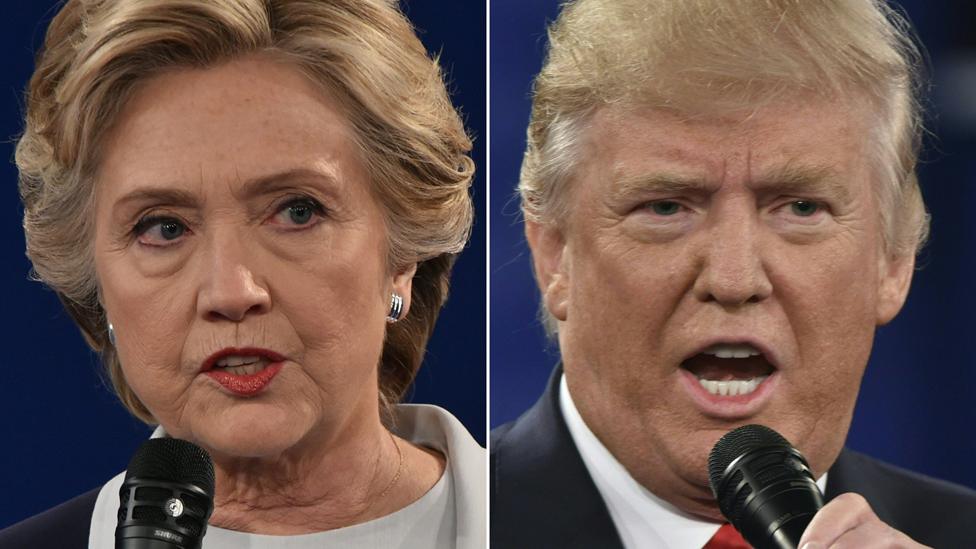
Who the Americans put in the White House makes a big difference to the world because US presidents have considerable power to shape foreign policy.
Think Lyndon Johnson and Vietnam; Richard Nixon and the opening to China; George Bushes Senior and Junior and their Iraq wars.
This election offers voters a real choice. Despite Donald Trump's sometimes incoherent and seemingly improvisational approach to foreign policy, the two candidates do offer quite different visions. Hillary Clinton firmly believes the US role is to uphold a global security order from which it also benefits, the Pax Americana at the core of traditional US military and diplomatic thinking.
Donald Trump's America First approach is more transactional. He frames alliances in business terms, vowing to get better value from them or pull back from historic commitments he says the US can no longer afford.
This is how their differences might play out in key international issues.

Nato
In no other area has Donald Trump departed more radically from decades of US foreign policy than his approach to traditional relationships. He has castigated Nato as outdated and obsolete and characterised its members as ungrateful allies who benefit from US largesse.
He says America can no longer afford to protect countries in Europe - and in Asia - without adequate compensation, suggesting he would withdraw American forces unless they pay up.
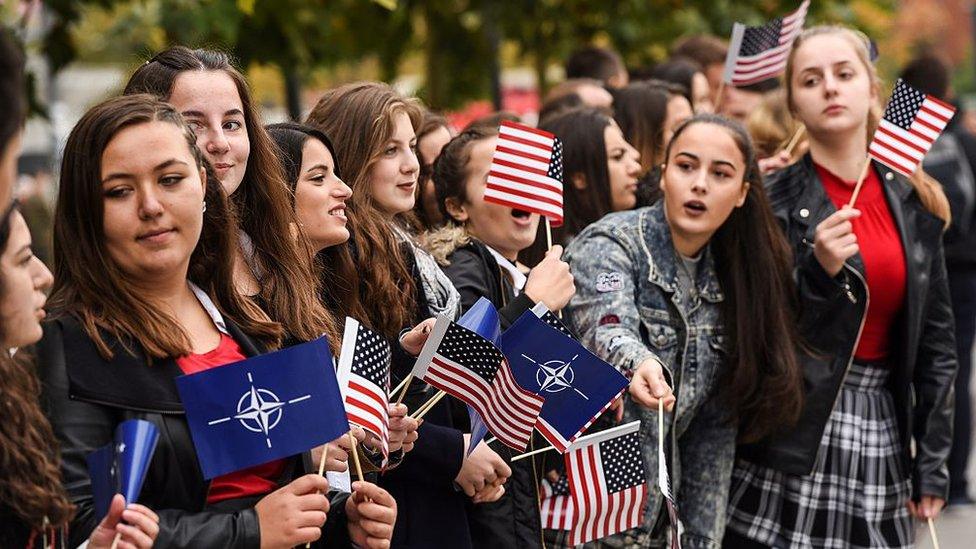
Kosovo Albanian youth wave US and NATO flags during a US Army and Kosovo Security Force running competition in Pristina. Approximately 4,600 troops from the Nato led Kosovo Force are still present in Kosovo
He's also said Nato members like the Baltic states couldn't count on the US to come to their military aid if attacked by Russia, unless they'd fulfilled their obligations.
Mr Trump is voicing longstanding criticisms. President Obama has also expressed frustration that most Nato members don't meet their goal of spending at least 2% of GDP on defence.
But Mr Obama stands firmly by the military alliance. As does Mrs Clinton, who proclaims Nato one of the best investments America has ever made.
She's said Mr Trump has made himself unfit for office by stepping away from Nato's "ironclad" mutual defence commitments, and some in his own party have warned his approach could embolden Russia.
Trump presidency 'would make world less safe' - ex-Nato boss

Russia
As Secretary of State Hillary Clinton was the architect of the "reset" aimed at greater co-operation with Russia, but she left office urging a harder line against President Vladimir Putin. That distrust carries over into her policy proposals to "stand up to Putin" and increase the costs of his actions.
While she acknowledges the US needs to work with Moscow where it can, she vows to partner with allies to limit its "aggression" in places like Ukraine and Syria.
She advocates strengthening Nato and improving the energy security of European states, and is willing to consider new sanctions.
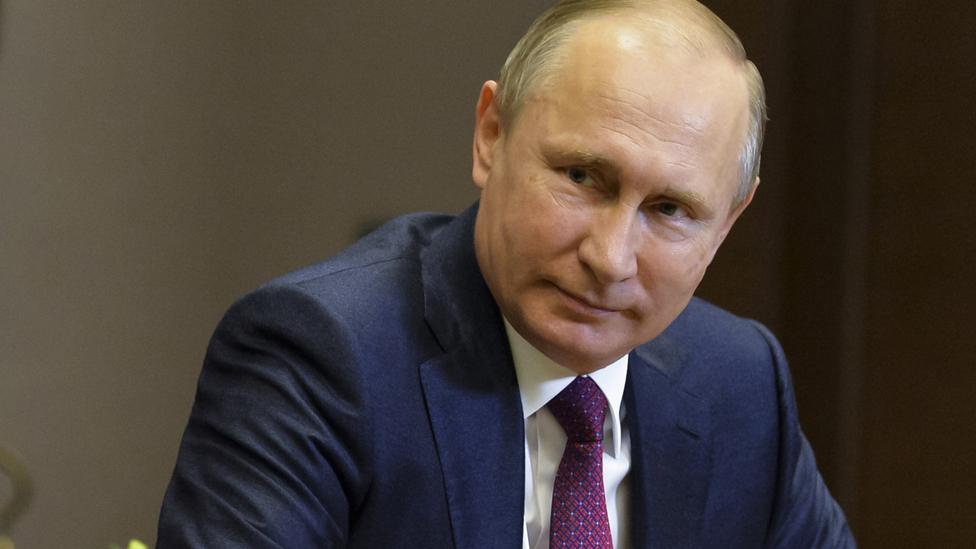
In a reversal of traditional party roles, it's the Republican Trump who has taken a more conciliatory tone to Moscow. But he's gone further than any other presidential candidate ever, amidst charges that Russia is trying to disrupt the election by hacking Democratic Party emails.
That's prompted allegations that his campaign has ties to the Kremlin. The real estate mogul has a history of business dealings with Russia and a number of advisers with Russian connections. The FBI, however, hasn't found, external any direct links.
Mr Trump says said he believes he can ease tensions with Mr Putin, and has praised him as a strong leader with whom he would love to have a good relationship.
He's said little about what this might involve beyond a desire for a joint fight against the Islamic State militants. But he intends to find out if the Russians would be "reasonable", confident that he could better command Mr Putin's respect than Mrs Clinton or President Obama.

Islamic State
Both candidates see so-called Islamic State as a global threat that must be defeated.
Hillary Clinton mostly adopts what President Obama is doing. Donald Trump talks tougher, vowing to "bomb the shit"out of IS and "take back the oil" from the group.
He's also criticised the current administration for failing to use the element of surprise in attacks, especially in the campaign against the IS-held city of Mosul.
The rhetoric is different, but many of the candidates' policy proposals sound similar.
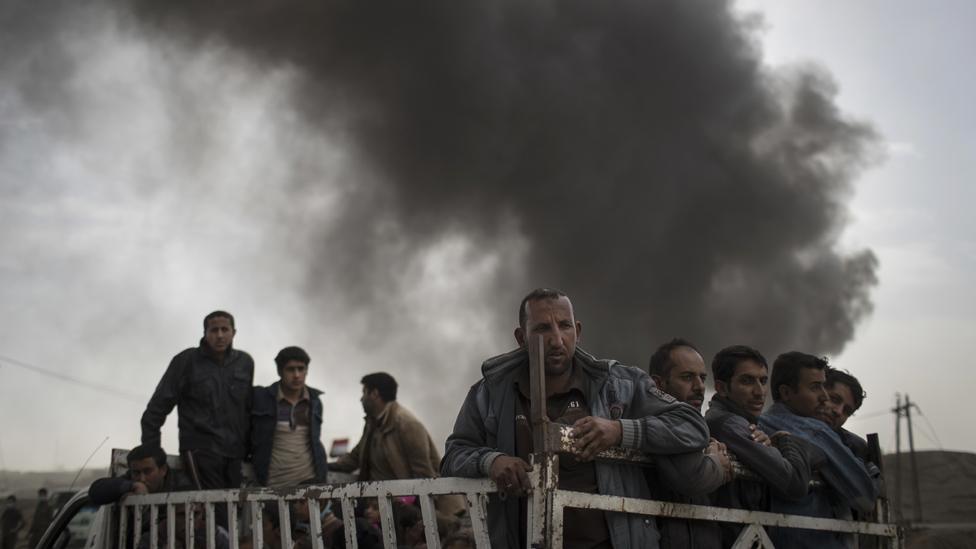
People displaced by the campaign against IS in Mosul stand on the back of a truck on 1 November
Both talk about fighting IS with a coalition of Western and Arab states in ways the US is already doing, although they would intensify the campaign. Neither would send American combat troops to fight the group in Iraq and Syria. Donald Trump flirted with the idea at one point but seems to have dropped it.
However, he is much more willing to work with Russia in the fight against IS than Mrs Clinton, and supports harsh interrogation techniques of captured fighters, which she does not.
The candidates might also differ on what happens the day after in Mosul is captured. Mrs Clinton seems more likely to invest in fixing sectarian politics that could lead to new conflict.
Syria
Broadly speaking, Hillary Clinton is open to involvement in the civil war and Donald Trump is not.
He does support a safe zone to stop the flood of refugees but says wealthy Arab countries should set it up.
In line with US policy, defeating so-called Islamic State is a higher priority for Mr Trump than persuading Bashar al-Assad to step down.
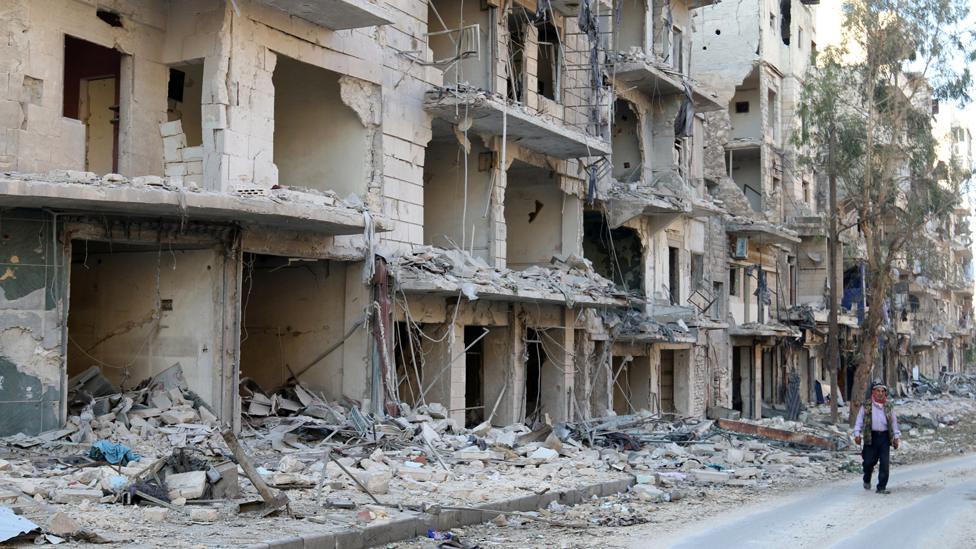
A man walks past damanaged buildings in the al-Sukkari neighbourhood of Aleppo in October
But he argues that the Syrian president is fighting IS, which Mrs Clinton disputes. He's also suggested he wouldn't back the rebels and that overthrowing Mr Assad could lead to something worse.
President Obama has similar misgivings, but covertly he does supply some rebels with some weapons and overtly he takes their side in peace talks. He also believes the Assad regime is the most destructive force in Syria and has to be replaced in order to change the environment that breeds Islamist violence. He has tried to achieve that through diplomacy but Mrs Clinton is prepared to go further.
She supports a No Fly Zone - a move that could lead to confronting Syrian and Russian warplanes. The idea would be to protect civilians and control some Syrian territory to use as leverage in a future settlement.
She might also be open to supplying heavier weapons to rebel groups. But the bottom line is that Moscow's military involvement in Syria has severely limited options. No one wants to go to war with Russia.
Iran
The Iran nuclear deal has reduced the immediate threat of a military confrontation with the US, but the new president may struggle to see it implemented.
Hillary Clinton supports the agreement. Indeed, she laid much of the groundwork for it while she was secretary of state. But she takes a tougher tone than President Obama.
She calls her approach "distrust and verify", promising to penalise Iran for any violations. She's also laid out a broader strategy to confront its "bad behaviour" in the region.

Can an American in Australia convince one in the US to vote?
More from the BBC

This includes maintaining Israel's military superiority, bolstering security cooperation with Arab allies in the Gulf, and building a coalition to counter Iran's proxies. And she's signalled that she'd take a more forthright stand against human rights violations than the Obama administration.
Donald Trump, on the other hand, hates the agreement and opposes all aspects of it - he's called it 'one of the worst deals ever made by any country in history,' and maintains that Iran got the better of Mr Obama and Mrs Clinton.
He contends he could renegotiate it, although hasn't convincingly spelled out how he'd be able to do that. His pledge to counter Iran's push to "destabilise and dominate" the region doesn't sound so different from Mrs Clinton's, although it lacks the detail.
Both are prepared to use force if Iran tries to obtain a nuclear weapon.

Israel/Palestine
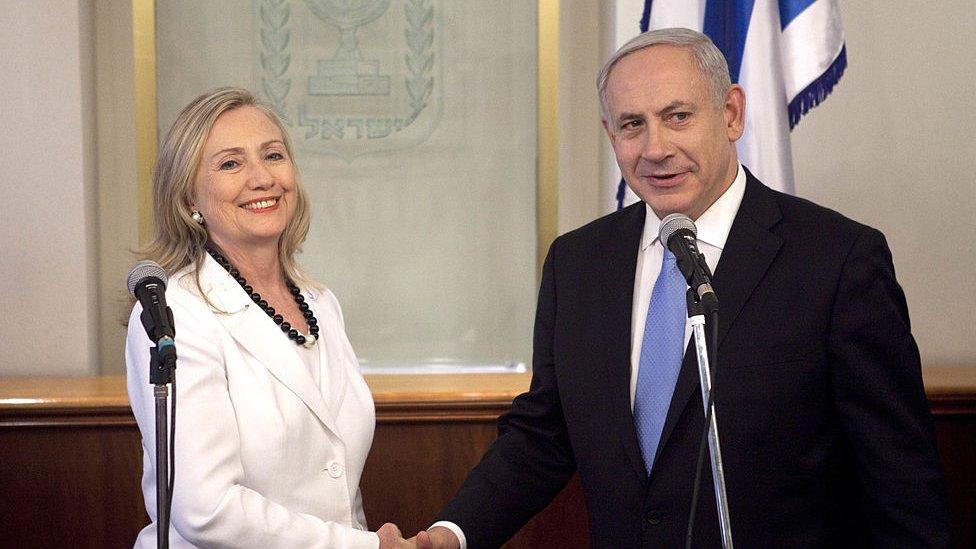
Clinton meets Netanyahu in 2012
There has been debate within the Democratic party about America's unconditional support for Israel, but that is not reflected in Hillary Clinton's platform.
She promises to guarantee Israel's qualitative military edge in the region, oppose the Boycott, Divestment and Sanctions movement, and cut off all efforts to unilaterally recognise Palestinian statehood or achieve it outside of direct negotiations with Israel.
Donald Trump initially pledged to be neutral in any peace talks. But he's since doubled down on promising an unbreakable alliance with Israel and taken a harder line on the Palestinians. He's said he supports a two-state solution but it would only be possible when the Palestinians overcome their "ingrained hatred" of Israel and stop "teaching their children to be terrorists".
His advisers, though, have questioned the viability of a two-state solution, a cornerstone of US policy, and any reference has been dropped from the Republican platform. That's distressed American Jewish lobbyists, who see it as essential to Israel's future as a democratic and Jewish state.
At the same time, Israel's Jerusalem Post newspaper has noted that Mrs Clinton showed limited interest in the Israeli-Palestinian conflict as secretary of state. It's suggested Prime Minister Benjamin Netanyahu would most likely welcome such a position after the Obama administration's failed attempts to broker a peace deal.

China
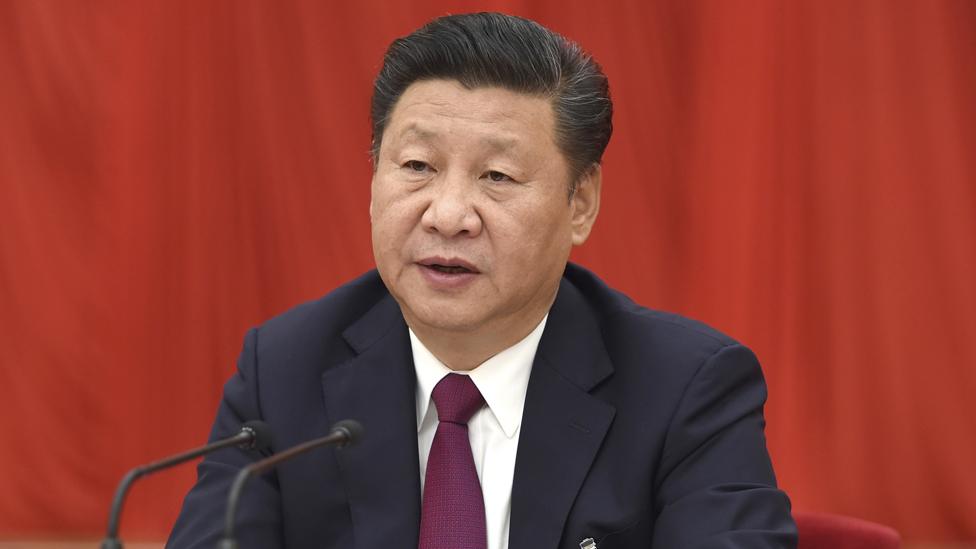
Chinese President Xi Jinping has consolidated power in China since he became leader of the country in 2013
The new president will inherit a crucial but complex relationship with this rising global power, characterised by disputes over its economic policy, charges of cyber theft, and claims to territory in the Asian seas.
Donald Trump approaches China primarily as a trade issue, singling Beijing out for criticism on dumping exports and devaluing its currency. He has said he would "use trade to negotiate", threatening tariffs as high as 45% and promising to designate Beijing as a currency manipulator.
Hillary Clinton has also vowed to impose consequences for trade abuses but says the relationship doesn't fit neatly into categories like friend or rival. She was a central actor in President Obama's strategic pivot to Asia and would continue to reinforce US alliances with Asian states as a counterweight to China.
Rupert Wingfield-Hayes says China is determined to assert its control
She calls for increasing co-operation with Beijing in areas of mutual interest, but would press it to play by international rules.
She'd take a stronger stand on China's human rights record. She'd also continue to challenge its programme of "island building" in disputed waters and might be more hawkish about conducting intrusive air and sea patrols to ensure freedom of navigation.
Mr Trump has attributed China's assertive behaviour in regional waters to American weakness, but he has not spelled out how he would respond to it.

North Korea
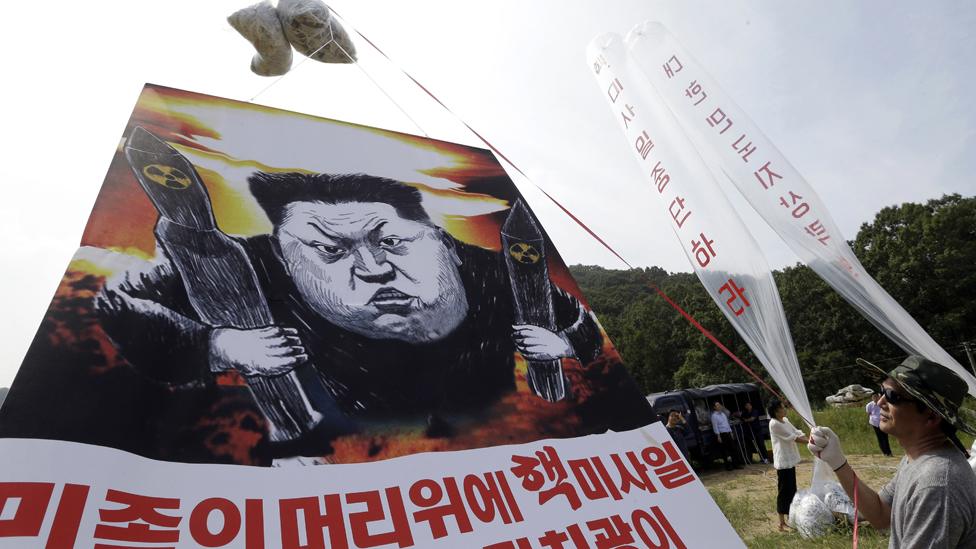
The next president will face a North Korea well on its way to becoming a nuclear power capable of delivering an atomic missile. Current US policy is a mix of sanctions and the promise of negotiations if Pyongyang abandons its nuclear programme.
That hasn't worked and isn't likely to, according to the head of US intelligence James Clapper.
He said recently that pressing the regime to give up its nuclear weapons was probably a "lost cause" because they were its "ticket to survival". The best the US could hope for, Clapper said, was a cap on North Korea's nuclear capabilities.
Nevertheless, Hillary Clinton would do more of the same: work with the UN to increase sanctions, bolster missile defences in Japan and South Korea, and press China to use its influence to deter Pyongyang.
Donald Trump suggests a more confrontational approach: he claims China has "total control" over North Korea and says he would "make trade very difficult" for Beijing if it didn't solve the problem.
He's prepared to talk directly with the isolated leader Kim Jong Un, a major shift in US policy. And he's said he'd be open to Japan developing its own nuclear deterrent, triggering fears of nuclear proliferation in East Asia.